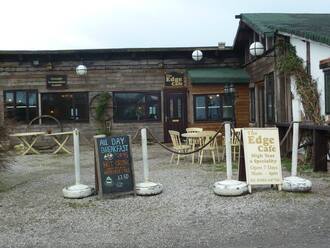-
Save The EdgeKMC please find a way of working with the Edge cafe and keeping it open. Quotes from customers include: 'Huddersfield does not have enough quirky places like this and this will attract walkers from outside the area. The food, people and place are fabulous and unique and should be treasured by the council as a true creative place. They welcome everyone; families, walkers, dogs, all is exactly as it should be on the Visit Huddersfield map!' 'It's somewhere special to take my mother-in-law. We can enjoy the food and the view and even see her house from up there too. :)' 'Fab place to call when out walking the dogs xxx nowhere else like it we need to keep this xxx' 'love this cafe, it is perfectly situated for access by walkers with dogs and children and I feel provides something a lot of places don't because it doesn't ENCOURAGE vehicle access.' 'Hope it can be saved or reinstated. It's such a fabulous, unique place. Great food and staff.' 'It's unique and a life safer for dog walkers... Aren't the council in support of us ditching our cars and getting us outside cycling/walking? This cafe has encouraged me to do this on several occasions.... It gets me,my children and the dog out in the fresh air with the promise of a treat along the way. The food is also fabulous. It has a real sense of community about it.' 'It is unique. :) The view is spectacular, and in the winter when it's too cold and windy to sit out, the indoor rooms are cosy. I appreciate being able to take my dog, which few cafés allow.' 'It is a lovely place to go, always made welcome, food is good supplied locally, employs people. It is quite unique and offers a much needed service where it is for dog walker, walker, football spectators and, just any one really. :-) :-)' 'Excellent community facility that provides a much needed cafe (with excellent home made produce from local providers) for Longwood residents. It's a stunning location and there's literally nothing like it around and about. Love the place.'541 of 600 SignaturesCreated by Joanne Smith
-
Save Achievement ButeAchievement Bute provides flexible individually tailored support to enable children with disabilities to participate in leisure activities of their choice and to support parents. They also run a range of inclusive regular clubs - events - holiday play-schemes and trips open to ALL children on the Isle of Bute. They provide a Counselling Service - parent support group - advocacy and an autism mentoring project. Argyll & Bute Council had originally promised full funding for Achievement Bute, but have since retracted this offer, which will no longer make Achievement Bute financially viable. https://www.facebook.com/helpsaveachievmentbute.co.uk739 of 800 SignaturesCreated by Hugh-Shug Moodie
-
Keep Merthyr Tydfil Nursery EducationThese nurseries are the foundation of our communities, our history and development. Some of these nurseries have been in our communities for over fifty years, giving 3 generations in some families of education with well trained, dedicated staff. These important years a child develops :- Physical development Cognitive development Emotional and social development Language development Sensory and motor development Not only will the development of the above be affective, but also the parents will be too. This will result in more mother's giving up work, because of childcare issues,and more people staying on benefits longer. Also the most vulnerable children in our society, `Children with Special Educational Needs` (SEN). Most of these children don't get a diagnosis until the problems are picked up at school, especially our nursery provision, as social and emotional disabilities don't begin to surface until a child starts school. There will be other issues effected by this, such as teacher's, LSAs and other support staff, including dinner and kichen staff all are at risk of job loss, reduction of hours and redundancies. Please support our petition and campaign to save our nurseries.1,247 of 2,000 SignaturesCreated by Paula Rees
-
Save The VicThe Vic Studios is the only public building with a recording studio kitted out with it's own equipment in; with the pending removal of music from the National Curriculum, it is imperative that other means of accessing music is available to young people. Also see https://www.facebook.com/groups/savethevicstudioswrexham/ for updates.1,484 of 2,000 SignaturesCreated by Ethan Jones
-
Security of pilgrims to Sri Vraja Bhumi.Barbaric Sexual Assault In Vrindavan On February 24, 2015 At 7 AM, in broad daylight, 82-year-old Chandrika Devi Dasi was raped and robbed at Kesi-ghat, Vrindavan. Chandrika is from Russia. She is a saintly vaisnavi and has come to Vrindavan to pass the final years of her life. In her advanced age has performed Vrindavan Parikrama everyday for the past five years. On February 24th, as she passed through Kesi-ghat, two Indian men, approximately 20 years of age, approached from behind and pushed her to the ground. One of the men stole her parikrama bag and ran away. The other man climbed upon her chest and held her mouth to keep her from screaming, pulled his genital from his cloth and while sitting upon her to keep her from moving, masturbated and passed semen on her chest. After his climax he jumped up to run away and a large knife fell from his cloth. He quickly grabbed the weapon and ran. By Krishna’s blessings Chandrika Devi Dasi broke no bones when she fell. She is shocked and traumatised by the event. Though there were pujaris at the Kesi-ghat temple but they did nothing to help. From her shock, and feeling of shame, she did not report the event to the police on the day that it happened. On the second day when I was informed I instructed her to file a First Information Report with the local police. She did so on February 25, 2015 I reported the incident to our Vrindavan Temple President he sent his legal assistant to deal with the local police. By Krishna's grace the criminals were captured within two days and legal proceedings have been opened against them. But, as events go in India, unless noise is made, they will simply pay a bribe and be released. What if someone tried to rape your 82 year old mother. What would you do ?918 of 1,000 SignaturesCreated by Rachel Stokes
-
SAVE HACKNEY'S OLD BOATERS' SCHOOLHOUSE!It is important to celebrate and commemorate the social history of the past and the community education of the future. The site has English Heritage and National Lottery Funded support to proceed forward with a preservation project and more support is forthcoming! The freeholder and Hackney Council promised the site as a Heritage and Arts Centre as early as 2009, but are now reneging on that promise in acquiescing to the freeholder's desires to profit from the site's transfer to residential use. If you have time, register your support in favour of saving the building for Heritage Community use to: [email protected]. And - if you are a Hackney resident - write to your local ward councillor! Stop the Greed! Save the Schoolhouse!1,025 of 2,000 Signatures
-
Protect Scotland's remaining wild land from developmentThe proportion of Scotland from which built development could not be seen has dropped by two fifths in 11 years, to 27% in 2013 - an immense change in Scotland's landscape. The remaining wild land has been officially mapped by Scottish Natural Heritage for inclusion in national planning policy. We the undersigned support the Mountaineering Council of Scotland in calling for no further industrial developments to be permitted in the areas of wild land that remain. Protecting the remaining wild land in this way will have many benefits: - Wild mountain landscapes form a vital part of Scotland's culture. - Wild and challenging landscapes inspire people to become more physically active, helping to combat national problems with inactivity; there is also strong evidence that they improve mental health - Tourism is one of Scotland's largest industries, and is by far the largest source of employment in the more remote communities that lie close to areas of wild land (the wild land itself, by definition, does not contain any communities). We need to protect jobs in these communities that depend on the continued existence of wild landscapes nearby. - Local councils will benefit from reducing the high costs they are currently incurring in having to deal with planning applications for inappropriate developments in wild land areas; the planning process, public inquiries and appeals often taking years. - The renewable energy industry will benefit by having been given clarity that wild land is not a suitable location for development. This will save money, time, controversy and reputational damage through planning battles in these areas. Renewable energy may be a vital part of Scotland's future, but wind farms - like all other large scale developments - can be sited elsewhere, in landscapes where visible development and intrusion is already prevalent. When wild land is developed, it is lost forever. More is being lost each year. We must protect what now remains of these precious landscapes.12,004 of 15,000 SignaturesCreated by David Gibson
-
Boycott Lloyds Bars/ WetherspoonsThe disabled are people too and should be afforded the same opportunities and rights as able bodied citizens.31 of 100 SignaturesCreated by John Mealey
-
Rozanne Duncan Must Resign at TDCBecause the people of Thanet deserve to be served by councillors who aren't racist "Leadership - Holders of public office should promote and support these principles by leadership and by example, and should act in a way that secures or preserves public confidence."417 of 500 SignaturesCreated by Ian Venables
-
All Scottish Public Libraries should hold copies of 'The National' for public reference'The National' is the only daily newspaper published that supports Scottish Independence.. In not carrying this title, public library services fail to present to the public a balanced view of the current political debate in Scotland.296 of 300 SignaturesCreated by Sean Gill
-
Boats Are Homes! Prevent the Eviction of Boat DwellersCanal & River Trust (CART) declared on 13th February 2015 that from 1st May this year it will refuse to re-license all boats that “don’t move … far enough or often enough” to meet its Guidance for Boaters without a Home Mooring – unless they take a permanent mooring. This places boat families under unique pressure as many cannot afford a mooring. Many boat dwellers work locally and some are key workers. Many require access to local services such as health care and schools and will be put to extreme difficulty if forced to move unreasonable distances. Like it or not, socio-political realities have made the waterways an affordable housing resource for many families. Canal & River Trust has long denied this reality, describing themselves as a 'navigation authority' and harbouring a marked hostility towards the water-based community. This position is no longer tenable and CART needs to accept its responsibilities as a landlord. MORE INFORMATION CART's new policy sets requirements that go beyond those stated in Section 17 (3)(c)(ii) of the British Waterways Act 1995. Boat dwellers are happy to comply with the clearly stated, lawful requirement not to remain continuously in any one place for more than 14 days. However, the 1995 Act does not contain any requirement to travel a minimum distance or to follow any specific cruising pattern beyond the 14-day limit. The new policy means that boat dwellers are being forced to travel distances that put them out of reach of their jobs or their children's schools, and make it impossible for them to access health care or to stay near elderly relatives. If they choose to keep their homes they will be faced with the need to give up working, take their children out of school, miss out on vital health care and abandon elderly family members. If a boat licence is terminated, or renewal refused, the boat is then unlicensed. CART has the power under Section 8 (2) of the British Waterways Act 1983 to seize, remove and sell unlicensed boats from its waterways. Section 13 (3) (a) of the British Waterways Act 1971 gives CART the power to demolish a houseboat that it has seized. In cases where a boat is lived on, CART obtains a Court Order and also obtains an Injunction banning the boat dweller from ever returning to its waterways. Breach of an Injunction carries the penalty of arrest and imprisonment. Therefore, the boat dweller not only becomes homeless but loses the only asset that they own. Information provided in response to a Freedom of information request showed that in 2010-2011 the enforcement team had a target to seize 100 "non compliant" boats each year. When boats are seized, CART contracts with a firm of Bailiffs to tow the boat away and the Police are present. Permanent residential moorings that boat dwellers can legally live on are in very short supply. Where they exist, they are very expensive (up to £25,000 per year in London). The majority of marinas will turn you away if you live on your boat. Over 90% of permanent moorings are non-residential (“leisure moorings”). CART knows that if boat dwellers live on leisure moorings they risk having planning enforcement action taken against them for unauthorised residential use. In London and the south there is a severe shortage of moorings and mooring fees are vastly inflated. CART's own directly managed moorings are priced using an auction system where the highest bidder wins. Some private moorings have waiting lists of 9 years and more. There is no security of tenure for boat moorings so even if you do take a mooring, you could be evicted at the whim of the marina owner. CART is the largest inland navigation authority in the UK. It owns or manages some 80% of the waterways. The Environment Agency and other smaller bodies own and/or manage the remaining 20%. If CART refuses to renew the licence of a boat dweller, there are few, if any, other places that a boat dweller can take their boat. CART's latest move is yet another attack on the right to use and live on a boat without a permanent mooring; a right that Parliament enshrined in law in 1995 when it passed Section 17 (3)(c)(ii) of the British Waterways Act 1995. Before 1995 British Waterways (which became CART in 2012) sought powers to force all boats to have a mooring and criminal penalties against anyone caught living on their boat without a permanent residential mooring and a houseboat certificate. Parliament refused British Waterways these powers and acted to protect the 10,000 or so boat dwellers that would have become homeless in 1995 by wording Section 17 (3)(c)(ii) of the British Waterways Act 1995 in such a way that it included a wide variety of patterns of boat use including those boat dwellers who needed to remain close to a place of work, children's education, health care or elderly relatives. The reasoning behind the wording of this section can be found in the Minutes of Evidence of the Select Committees that drafted the 1995 Act.34,027 of 35,000 SignaturesCreated by Account Deleted

-
Ask Edinburgh Council to keep Engine Shed openThe Engine Shed is a renowned training scheme which has transformed the lives of young people with learning disabilities for the past 25 years. They have helped many young people with learning disabilities gain skills in a real work environment and supported them to move into mainstream, paid employment. Trainees work alongside staff in the vegetarian café, organic bakery, organic tofu production unit and conference centre while developing skills for life. The Engine Shed is due to close down on the 19th February, 2015, due to Edinburgh Council stopping its funding. The.council says it will replace this with a new supported employment system, but critics point out that over 75% of Remploy employees are still unemployed after its closure. Let's ask Edinburgh Council to think again!6,675 of 7,000 SignaturesCreated by Jane Gaye Bell
Hello! We use cookies to improve your experience by providing insights into how the site is being used. Find out more.












